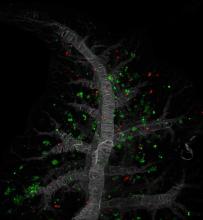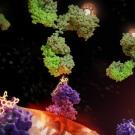News
Genes That Grow a Healthy Brain Could Fuel Adult Glioblastoma
UCSF scientists have discovered a new type of stem cell that helps young brains grow but is also capable of forming the cells found in tumors. The breakthrough could explain how adult brain cells take advantage of developmental processes to instigate the explosive growth seen in deadly brain cancers
Microplastics in the Air May Be Leading to Lung and Colon Cancers
Tires and degrading garbage shed tiny pieces of plastic into the air, creating a form of air pollution that UC San Francisco researchers suspect may be causing respiratory and other illnesses. A review of some 3,000 studies implicates these particles in a variety of serious health problems. These
Believe It or Not, 1 Vape is the Same as Smoking 30 Cigarettes
More than 1.6 million U.S. middle and high school students reported vaping in 2023, and nearly 90% used flavored vapes. But America’s youth vaping epidemic may be no accident. UC San Francisco Professor of Medicine Pamela Ling, MD, MPH, is the Director of the UCSF Center for Tobacco Control Research
How This Cancer Drug Could Make Radiation a Slam Dunk Therapy
Radiation is one of the most effective ways to kill a tumor. But these therapies are indiscriminate, and they can damage healthy tissues. Now, UC San Francisco scientists have developed a way to deliver radiation just to cancerous cells. The therapy combines a drug to mark the cancer cells for
International Conference Features UCSF Breast Cancer Experts
Breast cancer experts from UCSF Health will present new research and clinical findings at the annual San Antonio Breast Cancer Symposium, the world’s largest and most prestigious breast cancer conference. This year’s meeting will be held Dec. 10–13, 2024. Combining clinical, translational and basic
UCSF Health Experts Spotlight Advances at Hematology Conference
Hematologists and oncologists from around the world will present new research and clinical findings at the American Society of Hematology’s (ASH) 66th Annual Meeting and Exposition. This year’s meeting will be held in San Diego Dec. 7-10. Widely considered the world’s leading event in malignant and









